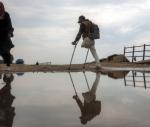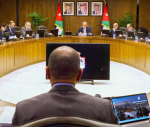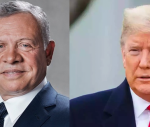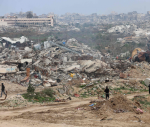You are here
The one sure thing about Syria
Mar 18,2014 - Last updated at Mar 18,2014
As the Syrian conflict entered its fourth year this week, government forces, assisted by battle-hardened fighters from Hizbollah, were able to retake the rebel city of Yabrud, in the Qalamoun mountain range.
It was a major victory for the regime of President Bashar Assad and a bitter defeat for opposition forces, which, after more than a month of bloody battles, were forced to abandon the strategic town.
The fall of Yabrud means that government forces are now in control of the highway between Damascus and Homs, and have full access to the coastal plains. It also means that rebels have lost a crucial gateway to Lebanon.
The opposition blamed lack of Western support for their latest loss. But while that could be true, it also underlined the effect of divisions among various rebel groups.
The Free Syrian Army (FSA), Jabhat Al Nusra and others are still unable to unite their efforts on the ground.
The regime has benefitted greatly from the fighting among radical Islamist groups, mainly the Islamic State of Iraq and the Levant and the FSA and Jabhat Al Nusra in Aleppo, Idlib and northeastern regions.
The battle for Yabrud raged for well over a month, and yet there was little attention given to it by the West.
The Obama administration is still reviewing its options in Syria. The outbreak of the Ukrainian crisis and Russia’s incursion in Crimea last month overshadowed the Syrian crisis.
UN-Arab League special envoy Lakhdar Brahimi admitted that chances for holding a third round of negotiations in Geneva are weak. He submitted his report to the UN Security Council last week and told reporters afterwards that if Syria goes ahead with holding presidential elections in the coming few months, the opposition will not be interested in resuming negotiations.
Brahimi headed to Iran, Syria’s close ally, in a bid to convince Tehran to put pressure on the Syrian regime. Few believe his efforts will work.
Observers think that Assad will win a third seven-year term.
Syrian officials were critical of Brahimi’s remarks and insisted that holding the elections was a “sovereign domestic matter”.
It is clear that the Syrian president is determined to continue with the military option. His forces have been making important gains in recent weeks.
After Yabrud he may turn his attention to Aleppo, the biggest Syrian city and the most important stronghold for the opposition.
The battle for Aleppo may decide the future of the conflict.
Assad has made good use of his resources and regional political developments. International pressure on him has decreased since the eruption of the Ukraine crisis, and a recent dispute among Gulf states, including Saudi Arabia and Qatar, two important backers of the opposition, has improved his odds.
Turkey’s internal problems, over alleged government corruption, have also boosted his position.
The Syrian crisis has gone through three major junctures since it erupted four years ago: it started as a spontaneous and peaceful popular uprising which was dealt with by force; the uprising was militarised as opponents also resorted to violence; it turned into a regional conflict as foreign fighters joined, with Hizbollah, Iranian and Iraqi groups siding with the regime, and jihadists crossing the border to join the opposition.
The only way a political solution can be found is for Washington and Moscow to work together and come up with a plan that satisfies all parties. That remains a tall order.
The alternative, as it now appears, is that the war will continue for many months.
Still, it is unlikely that the regime will be able to liberate the entire country. In spite of recent losses, the opposition continues to present a serious challenge.
It will be able to drain and weaken government forces in other areas. And it is still possible that some rebel groups will receive modern weapons that will make it harder for the regime to make new advances.
Assad’s re-election will bury current political efforts. It will force the West to reconsider its options.
The presence of foreign jihadists has hurt the cause of the opposition. Assad’s claim that he is fighting terrorism is vindicated for now.
The biggest loss to the opposition will be for some key supporters, like Saudi Arabia and Turkey, to recalibrate their positions.
With fighting raging on in Syria, the biggest challenge to its neighbours and to humanitarian agencies is to deal with the refugee problem.
So far, efforts to create safe corridors for civilians and end the siege of towns and refugee camps have failed.
The human cost will continue to rise. Syria is proving to be a big failure for the international community.
Assad has defied all odds and survived. His opponents are divided both at political and military levels. It is unlikely that Russia and the US will find accord on Syria soon.
The only sure thing about Syria today is that the war will continue.
The writer is a journalist and political commentator based in Amman.













